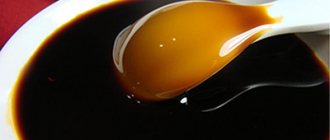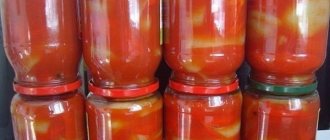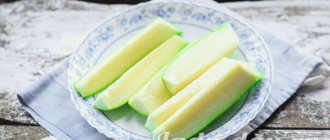Zucchini is a vegetable belonging to the pumpkin family. They have an oblong shape, reminiscent of a cucumber.
The skin of zucchini is smooth, and the color depends on the variety. Varieties with dark skin are considered more nutritious.
The pulp of zucchini is watery, tender and crispy. There are edible seeds inside.
Mexico and Central America are considered the birthplace of zucchini. The largest suppliers of zucchini are Japan, Italy, Argentina, China, Turkey, Romania and Egypt.
Chemical composition of zucchini
Zucchini is a vegetable unique in its composition and medicinal properties. And although it consists of almost 95% water, its natural possibilities are limitless. This is caused by the content in zucchini (even in small quantities) of a mass of useful micro-macroelements, vitamins, minerals and other substances necessary for health.
You can familiarize yourself in detail with the chemical composition of zucchini using a ready-made calorie table, which shows not only the components of the natural product (calculated for every 100 grams of vegetable), but also the amount in which they appear in it.
| Useful material | Calories (kcal) per 100 g. product |
| Microelements | |
| Iron | 0.4 mg. |
| Macronutrients | |
| Phosphorus | 12 mg. |
| Magnesium | 9 mg. |
| Potassium | 238 mg. |
| Calcium | 15 mg. |
| Sodium | 2 mg. |
| Vitamins | |
| Vitamin A | 5 mcg. |
| Thiamine (vitamin B1) | 0.03 mg. |
| Riboflavin (vitamin B2) | 0.03 mg. |
| Vitamin B5 | 0.1 mg. |
| Vitamin B6 | 0.1 mg. |
| Folic acid (vitamin B9) | 14 mcg. |
| Vitamin PP | 0.6 mg. |
| Vitamin C | 15 mg. |
| Biotin (vitamin H) | 0.4 mcg. |
| Vitamin E | 0.1 mg. |
| Vitamin PP (niacin equivalent) | 0.7 mg. |
| Beta-carotene | 0.03 mg. |
It is noteworthy that zucchini contains no trans fats or cholesterol at all, and fatty acids are present in the vegetable in minimal quantities. This provides the product with a powerful beneficial effect on the human body and turns the vegetable into a real valuable dietary product.
How to cook and serve
You can prepare zucchini in different ways: bake, boil, fry, marinate, stuff, make jam and compote, make puddings, cutlets, stews, zucchini caviar, steam.
Cucumbers, tuna, fennel, and carrots go perfectly with zucchini in salads.
Zucchini can be served with vegetables, meat, fish and even dairy products.
Fresh zucchini is good to use in salads. Young zucchini with thin, unpeeled peel and juicy pulp will be best digested. Young skin is rich in vitamin C.
Nutritional and energy value of zucchini
The calorie content (or as it is also called, energy value) of raw zucchini depends on many factors. But the main ones are:
- mineral and vitamin (chemical) composition of the vegetable;
- nutritional value of a natural product.
Since we have determined the first important component of calorie measurement - the chemical composition - using a table, it is time to pay attention to the second main factor - the nutritional value of zucchini.
This term refers to the presence of carbohydrates, proteins and fats (bzhu) in the product. It is the presence of bju in zucchini that allows you to accurately determine the nutritional value of a fresh product.
We will consider the quantities of these elements in detail in the table below, and at the same time find out how many calories each of the named components contains.
| Main nutritional components | Quantity in grams (g) | Calories (kcal) per 100 g. product |
| Fats | 0,3 | 3 |
| Squirrels | 0,6 | 2 |
| Carbohydrates | 4,6 | 18 |
The total calorie content of raw zucchini is 24 kcal. The table shows that the bulk of the calories in zucchini - 23 kcal - are proteins, carbohydrates and fats. This suggests that calories in 100 grams. zucchini also depend on other, albeit less important, elements.
The remaining 1 kilocalorie is divided among themselves by such useful substances as:
- organic acids (0.1 g);
- ash (0.4 g);
- saturated and unsaturated fatty acids (0.1 g each);
- water (93 g);
- dietary fiber (1 g);
- mono- and disaccharides (4.6 g).
Thanks to such a small amount of calories, zucchini can be consumed in large quantities and in any form. Boiled, baked or fried - it will still have a gentle effect on your figure without adding unnecessary pounds.
Raw Zucchini: Health Benefits
The rich chemical composition of the vegetable could not but affect its natural beneficial properties. Possessing a full arsenal of medicinal functions necessary for human health and vital activity, zucchini can be used for the treatment, as well as for the prevention of diseases of almost all organs and systems of the human body.
But in addition to the general beneficial properties that are necessary for all people without exception, zucchini can provide separate benefits, that is, have a special effect on women’s and men’s health.
To whom and how are raw zucchini useful? It’s not difficult to answer this question. Almost everyone can eat the vegetable, because it contains almost no organic acids and has extremely delicate cellulose, which does not have an aggressive effect on the gastrointestinal tract.
However, the benefits of zucchini lie not only in normalizing the functioning of the digestive system. The beneficial properties of a natural product have a much wider spectrum of action.
For example, the medicinal functions of zucchini provide:
- removing all kinds of harmful substances from the body, such as cholesterol, toxins, radionuclides. This ability is based on the choleretic and diuretic effects of the vegetable, which are inherent in it by nature itself. Thanks to this cleansing function, the artisanal vegetable is recommended for people suffering from liver and kidney diseases;
- preventing the appearance of atherosclerosis;
- improvement in diabetes mellitus;
- normalization of the body’s water balance, which helps to get rid of excessively accumulated fluid;
- positive effect on the process of blood renewal;
- improving the condition of blood vessels and facial blood microcirculation;
- calming effect on the nervous system and increasing the body’s overall resistance to stress;
- lowering blood pressure;
- improving the condition of the skin. Thanks to its natural moisturizing function, eating zucchini can provide the skin with a healthy color, as well as reliable protection from ultraviolet rays.
In addition to the beneficial properties listed above, raw zucchini is also used for other purposes, for example, for weight loss and rejuvenation.
Losing weight with the help of zucchini occurs not only due to the low calorie content of the product, but also due to the fact that the vegetable gives a feeling of fullness, which reduces cravings for food. This contributes to gradual weight loss, without burden or stress on the body.
What are the benefits of zucchini for women?
The benefits of a vegetable like zucchini are priceless, especially when it comes to women’s health. The beneficial properties of the grown product gain the greatest significance when a woman is expecting a baby. It is during pregnancy, as well as during lactation, that zucchini becomes especially useful and necessary.
The benefits of zucchini, which lie in its chemical composition, help a pregnant woman fight edema, constipation and excessive weight gain. Since the glycemic index of zucchini is approximately 15 units, you should not worry about rapid weight gain if you eat it frequently.
Zucchini will not affect the appearance of extra pounds during pregnancy; on the contrary, it will contribute to moderate weight loss.
However, in addition to the benefits for the pregnant woman herself, zucchini has a beneficial effect on the formation and development of her fetus. Many of the beneficial substances contained in the vegetable directly affect the intrauterine baby.
For example, calcium actively promotes the formation of the child’s skeletal system (in addition, this macronutrient significantly reduces the risk of miscarriage), and B-group vitamins (especially folic acid) affect the laying of the correct foundations of the nervous system. What determines the full development in the future, and ultimately the birth of a healthy baby, without any pathologies.
What are the benefits of zucchini for men?
Zucchini is also essential for men's health. Some of its properties help prevent the development of dangerous male diseases such as prostatitis and prostate cancer. Such diseases not only threaten complications, but also significantly reduce the quality of life, since they cause disturbances in the functioning of the genitourinary system and lead to sexual dysfunction.
It is especially important for older men to consume zucchini: it has been scientifically proven that benign enlargement of prostate tissue (cancer) occurs in almost all representatives of the stronger sex at approximately the age of 80 years. Therefore, regular consumption of zucchini will be a good prevention of these ailments.
Contraindications and harmful properties of zucchini
Although zucchini is considered an extremely positive product, it still has several pitfalls. The harmful properties of a vegetable, as well as the beneficial ones, depend on its chemical composition. Some elements are contained in zucchini in large quantities, which negatively affects the health of people who have certain diseases or chronic conditions.
Contraindications for consuming zucchini include the following diseases:
- gastritis;
- stomach ulcer;
- renal failure;
- increased stomach acidity;
- exacerbation of the inflammatory process in the gastrointestinal tract;
- gallbladder problems.
If none of the above diagnoses have been established for you, then you can eat zucchini in unlimited quantities; they will not cause any harm to your body.
Beneficial features
Zucchini is a dietary product that improves stomach function and cleanses the body of harmful accumulations. Eating zucchini also has a beneficial effect on the entire body:
- nourishes and stimulates the heart muscle and blood vessels;
- has a good diuretic effect;
- helps cope with excess weight;
- stimulates the gastrointestinal tract;
- supports immunity;
- antioxidants slow down the aging process;
- remove excess salts from the body;
- help with cholecystitis;
- enhance intestinal motility;
- used in baby food;
- Zucchini seeds are used medicinally against tapeworms.
Interesting fact! Zucchini pulp perfectly rejuvenates and whitens the skin. In cosmetology, masks are made from it to restore dry skin.
Zucchini seeds: benefits and harms
In addition to eating vegetable pulp, zucchini seeds are also actively used in cooking and folk medicine. In terms of their benefits, the seeds are in no way inferior to the vegetable itself; they are no less beneficial for the health of each of us. But this is only if the seeds are not fried or prepared with oil.
Dried seeds are most beneficial for the human body. In their medicinal properties and chemical composition, they are very similar to pumpkin. They contain not only all kinds of minerals and vitamins, but also an effective anthelmintic substance - santonin. Zucchini seeds also contain antioxidants, all of which together have powerful positive effects on health.
Summarizing all of the above, we can safely say that the seeds can help in the treatment of such painful conditions as:
- avitaminosis;
- depression;
- apathy, irritability;
- panic attacks;
- insomnia;
- stress;
- weakness.
It is also good to use the seeds in the presence of helminthic infestations, during pregnancy and diabetes. The seeds help ease your well-being during illness and reduce the manifestation of toxicosis during pregnancy.
Harmful properties of zucchini seeds
We have already found out what benefits the seeds have. But whether such a useful product has negative qualities remains to be determined. In fact, the seeds have few harmful properties; the only contraindications for use are kidney disease, ulcers and gastritis.
It is also not recommended to consume seeds for pregnant women who are overweight. Unlike low-calorie pulp, zucchini seeds contain many calories, so consuming them by overweight women will only lead to additional weight gain.
In other cases, the seeds simply need to be consumed to keep your body in good shape and in a good mood.
Kinds
The regular zucchini has a variety called zucchini. The main difference between zucchini is that they ripen faster, have more tender and juicy pulp and thin skin. Depending on the variety, zucchini can have different tastes and colors.
There are many varieties of zucchini, but there are two main differences:
- Foreign varieties are most often hybrids and can grow for a longer time without overripening. These varieties are suitable for quick consumption as they have thin skin and fewer seeds.
- Russian varieties are frost-resistant, store well, and retain their qualities when preserved.
Zucchini, eggplant, cucumber: which is healthier?
Nature has given us so many valuable food products that sometimes you get lost, not knowing what to take for a salad or side dish, or even just can’t choose which raw vegetable to snack on in between main meals. When it comes to choosing between nutritious, but low-calorie foods, the question often arises - which is healthier: cucumber, zucchini or eggplant?
All of the above vegetables contain few calories, so they are considered dietary. Even their frequent use cannot affect weight gain. Moreover, high-calorie dishes, which include cucumbers, zucchini and eggplants, lose their extra calories precisely due to the presence of these special ingredients.
Cucumbers and zucchini are considered representatives of the same garden family - the pumpkin family. Even many of their beneficial properties are similar to each other.
- Both zucchini and cucumbers have a diuretic effect, so they are good to use for people who have edema that occurs during pregnancy, heart disease, vascular disease, kidney disease, etc.
- The moisturizing effect of natural vegetables is good for the skin, so you can use zucchini and cucumbers not only internally (as food), but also externally (in the form of moisturizing masks).
- Eggplants also have a whole range of beneficial properties. And although they do not belong to the pumpkin family, it is impossible to imagine a healthy person’s diet without them.
Each vegetable is unique and important for our health. Therefore, do not look for the answer to the question of what is healthier: cucumber, zucchini or eggplant, but simply eat these most valuable gifts of nature regularly - and then your health will only be enviable.
Zucchini dishes: calorie content
Zucchini is a universal product not only in its chemical composition, but also in its taste, which can be used beneficially in preparing a variety of dishes. For housewives who are tirelessly looking for recipes for dishes based on this vegetable, we can offer a whole list of tasty treats made from different varieties of zucchini.
Traditionally, light varieties of vegetables are used for cooking, but its dark subspecies - zucchini - is no less popular. Sometimes, housewives give more preference to the latter, both during the period of spinning and during the period of preparing quick dishes for lunch or dinner.
This choice is due to the fact that the pulp of zucchini is softer and more tender compared to ordinary zucchini. In addition, there are even fewer calories in dark-colored vegetables than in light varieties, and the taste of raw zucchini is much more pleasant than the raw taste of ordinary zucchini. But since the light appearance of the vegetable is more popular in our latitudes, it is from it that various treats of any complexity are prepared.
To find out what kind of zucchini dishes can be prepared and what their caloric content will be, we suggest you familiarize yourself with the table of already calculated calories of ready-made dishes.
| Names of ready-made dishes | Calories (kcal) per hundred grams of product |
| Sauteed zucchini | 40,56 |
| Zucchini casserole | 142,3 |
| Zucchini casserole with cottage cheese | 0 |
| Boiled zucchini | 22,50 |
| Boiled zucchini stuffed with meat | 60,3 |
| Baked in the oven | 24 |
| Pickled (canned) | 22 |
| Raw zucchini (this type of zucchini is considered a ready-made dish even when raw) | 16 |
| Fried in vegetable or butter | 88 |
| Zucchini puree | 24 |
| Zucchini cake | 195,11 |
| Zucchini pancakes | 139 |
The dishes above are just some of the few popular culinary uses for zucchini. In fact, you can prepare much more interesting treats from a healthy vegetable, recipes for which can be found on our website.
Period and storage conditions of zucchini
Proper storage of vegetables at home allows you to preserve their natural properties, freshness, taste and even aroma for a long time. Each vegetable has its own rules and its own storage technology.
For example, some products spoil quickly and cannot be stored fresh for the winter, while others survive until the next harvest. If zucchini is stored correctly, it can easily overwinter in your house and end up in some side dish or casserole in the spring and summer.
As a rule, young zucchini is stored for 15-20 days. This is the optimal shelf life, provided that all this time the vegetables were kept at a temperature of +4- +6 and at a relative air humidity of 85-90%.
But if the storage period needs to be extended over a longer period, these conditions will not be enough.
Rules for storing zucchini in winter
Young zucchini
It is better to store young zucchini of light varieties (not zucchini) on the bottom shelf of the refrigerator, after placing them in an enamel tray (necessarily with an open lid) or in a regular plastic bag with small holes.
This is necessary to prevent condensation from forming.
Ripe zucchini
Ripe zucchini (but not overripe) should be stored in a dry, cool and poorly lit room. Just before storing vegetables, do not forget to select the most suitable ones: whole, undamaged and with the presence of a stalk.
By following all these rules, you can store vegetables for about six months.
Historical facts
Central America is considered the birthplace of zucchini, where they were grown 5 thousand years ago. The wonderful vegetable came to Europe in the 16th century.
The origin of zucchini has a beautiful romantic legend: while waiting for their men from a long voyage, Indian women met the gods on the seashore, who gave them beautiful zucchini fruits.
It’s curious: zucchini used to be considered an ornamental plant for decorating gardens, and only later did they begin to use this valuable vegetable in European cuisine.










